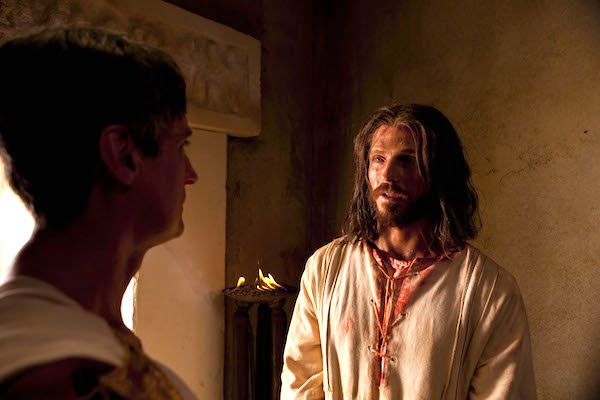LENT 2024: Day 26 - LIFE OF CHRIST

LENT 2024: DAY 26 - Thursday March 14
“The trial of Christ the Prophet was over; now began the trial of Christ the King. The religious judges had found Our Lord too Divine because He had called Himself God; now the civil judges will condemn Him for being too human. When a higher court hears a case presented to it by a lower court, there is a continuity of charges. The religious judges did not have the power of life and death, since the Romans had conquered their land. It was to be expected, therefore, that when our Blessed Lord was led before the superior court of Pilate, exactly the same charge would be filed against Him, namely, blasphemy. The approval and sentence of death required, however, the seal of Pilate. There were two ways in which the Sanhedrin could have done this: either by Pilate accepting the judgment of the religious court, or by opening a new trial in the civil court of their conquerors. The second was the method chosen, and shrewdly enough. The Sanhedrin knew very well that Pilate would laugh at them, if they told him that Christ was guilty of blasphemy. They had their god; he had his gods. Furthermore, since this was a purely religious charge, Pilate might have referred it back to their own court without sentencing Christ to death.
In order to understand the relationship between the conquered and the conqueror, a word must be said about Pilate and Jewish hatred of him. Pilate, the sixth Roman procurator of Judea since the conquest, had held his office for some ten years during the reign of the Emperor Tiberius. His arbitrary and sometimes cruel conduct had led to repeated uprisings by the Jews which he had suppressed with violent measures.
Very early in the morning, all the members of the Sanhedrin – including the priests, elders, and Scribes – decided to bring Christ to Pilate and ask for the death sentence. The priests were indignant that He had spoken of Himself as the Lamb of God… After completing plans for putting Him to death: “They led Him away in bonds, and gave Him up to the governor, Pontius Pilate.” (Matthew 27:2)… Leading Him away to Pilate was one of the turning points in the Passion, for it fulfilled the prophecy that Our Blessed Lord had uttered: “He will be given up to the Gentiles, and mocked, and beaten, and spat upon; they will scourge Him, and then they will kill Him; but on the third day He will rise again.” (Luke 18:32-33) The Sanhedrin led Him away because they had rejected the promise of Salvation that came from the Messias; now it remained for the Gentiles to decide what they would do, whether they would reject the King as the Sanhedrin had rejected the Prophet. The great wall between the Jew and the Gentile was eventually broken down, since both condemned Him to death… Thus the responsibility for His death cannot be put upon any one people, but upon all mankind.
When the officials of the Sanhedrin arrived at the praetorium (or the house of the Governor), Pilate went out to meet them, for he knew that they would consider themselves unclean if forced to come in. Carrying on the Roman tradition of respect for law, he declared that he would not pass sentence unless the evidence showed the accused to be guilty. So he asked the Sanhedrin: “What charge do you bring against this man?” (John 18:29)… “We would not have given Him up to thee, if He had not been a malefactor.” (John 18:30) Nothing was said about blasphemy. They knew that charge would be useless before a Gentile... so they used the general term “malefactor”.
Pilate… not wishing to handle the case, told them to judge Him according to their own law. But they answered that they had no power to put any man to death – which indeed was true, since that belonged to Rome.
They now brought three charges against Our Lord in order to force Pilate to hear the case: “We have discovered that this Man is subverting the loyalty of our people, forbids the payment of tribute to Caesar, and calls Himself Christ the King.” (Luke 23:2) Still no mention of blasphemy; the charge now was sedition; Christ was unpatriotic… too political… anti-Caesar, anti-Rome… Secondly, He was urging the people not to pay taxes to the king or to Caesar. And thirdly, He was setting Himself up as a rival king to Pilate… Every word was a lie.
Pilate suspected their sincerity because He knew how much the Jes hated him and Caesar. But one charge worried him slightly. Was this Prisoner before him a king? Pilate summoned Our Lord inside the house. Once in the judgment hall, Pilate asked: “Art Thou the King of the Jews?” (John 18:33)… Our Lord now made clear that a distinction had to be made between a political and religious kingship; political kingship which was the only interest Pilate had in the case, the Master rejected; religious Kingship which meant that He was the Messias, Our Lord admitted. To the skeptical Pilate Our Blessed Lord had to make clear that His Kingship was not that of an earthly kingdom obtained by military power; it was rather a spiritual Kingdom to be established in truth. He would have only moral subjects, not political one; He would reign in hearts, not in armies.
All this puzzled Pilate, who changed his question. The first time Pilate had asked, “Art Thou King of the Jews?” Now he asked: “Thou art a King, then?” (John 18:37)… Our Lord… answered: “It is thy own lips that have called Me a King. What I was born for, what I came into the world for, is to bear witness of the truth. Whoever belongs to the truth, listens to My voice.” (John 18:37)… Pilate evidently caught the idea that moral conduct had something to do with the discovery of truth, so he resorted to pragmatism and utilitarianism, and sneered the question: “What is truth?” (John 18:38) Then, he turned his back on truth – better not on it, but on Him Who is Truth.
Pilate now began the first of several attempts to rescue Christ, such as a declaration of His innocence, a choice between prisoners, a scrouging, an appeal to sympathy, a change of judges. Pilate, not understanding hwo anyone could die for truth, naturally could not understand how Truth Itself could die for those who erred. After turning his back upon the Logos Incarnate, he carried to the people outside his conviction that the Prisoner before him was innocent. “I can find no fault in Him.” (John 18:38) If there was no fault in Him, Pilate should have released Him. On hearing the Roman governor’s declaration that the Prisoner was innocent, the members of the Sanhedrin became more violent in their accusation that He was an insurrectionist and revolutionist: “He rouses sedition among the people; He has gone round the whole of Judea preaching, beginning in Galilee and ending here.” (Luke 23:5)
Pilate’s supreme interest was the peace of the state; hence the supreme interest of the Sanhedrin was to prove that Christ was a disturber of the peace. As soon as Pilate heard the word “Galilee”, he saw an escape from judging Christ… As the Sanhedrin had changed the charge from blasphemy to sedition, so Pilate would turn over jurisdiction of the trial to one who had power in Galilee.
Herod, by reason of the Passover, was now in Jerusalem. Though he and Herod were enemies, Pilate nevertheless was anxious to shift the responsibility of acquitting or condemning Christ to Herod.
This Herod was Herod Antipas, the son of Herod the Great, who had caused all the male children under two years of age to be murdered at Bethlehem… Herod Antipas was a sensual, worldly man; he had murdered John the Baptist because John condemned him for divorcing his wife and living with his brother’s wife. Herod had an uneasy conscience not only because he had slain the announcer of Christ but also because his superstitions made him believe that John the Baptist had risen and was haunting his soul.
When Our Lord was brought to Herod: “Herod was overjoyed at seeing Jesus; for a long time he had been eager to have sight of Him, because he had heard so much of Him , and now he hoped to witness some miracle of His.” (Luke 23:8)… Though Herod was glad to see Our Lord, his gladness did not arise from noble motives of repentance. Hence, the Christ, Who spoke to a penitent thief and to Magdalen and Judas, would not speak to the Galilean king… He wanted miracles, not as motives of credibility, but as delights to his curiosity… It was not his soul for salvation that Herod offered the Lord, but only his nerves for titillation. So the Lord of the world spoke not a world to the worldling.
The silence of Our Lord so irritated Herod that his insulted pride turned to scoffing and mockery: “So Herod and his attendants made a jest of Him, arraying Him in festal attire out of mockery, and sent Him back to Pilate.” (Luke 23:11)

(Chapter 45, pgs. 735 – 753)
+ QUOTES FOR LIFE